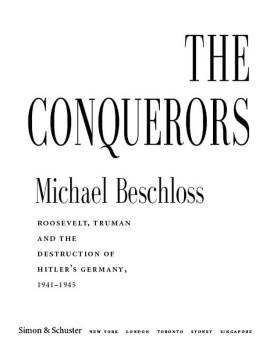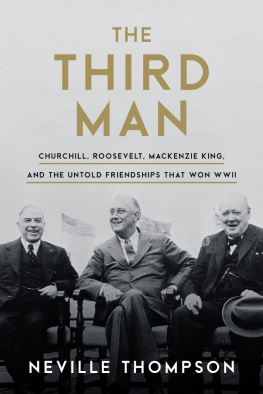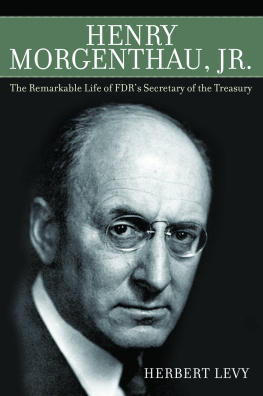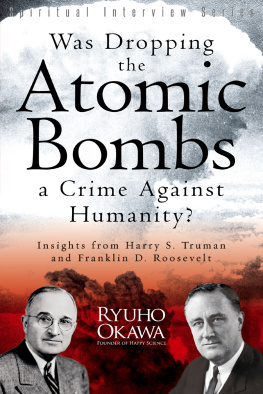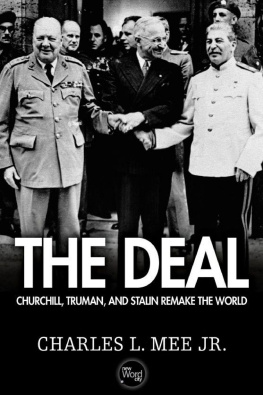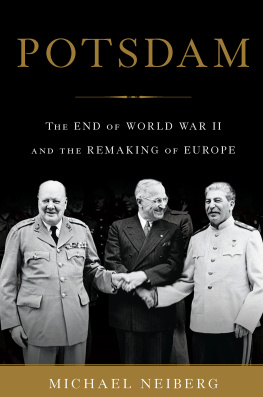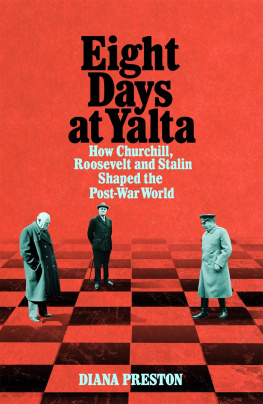Books by Michael Beschloss
Reaching for Glory: Lyndon Johnsons Secret White House Tapes, 19641965 (2001)
Taking Charge: The Johnson White House Tapes, 19631964 (1997)
The Crisis Years: Kennedy and Khrushchev, 19601963 (1991)
Mayday: Eisenhower, Khrushchev and the U-2 Affair (1986)
Kennedy and Roosevelt: The Uneasy Alliance (1980)
At the Highest Levels: The Inside Story of the End of the Cold War (1993)
(with Strobe Talbott)

SIMON & SCHUSTER
Rockefeller Center
1230 Avenue of the Americas, New York, NY 10020
Copyright 2002 by Michael Beschloss
All rights reserved, including the right of reproduction in whole or in part in any form.
SIMON & SCHUSTER and colophon are registered trademarks of Simon & Schuster, Inc.
Library of Congress Cataloging-in-Publication Data
Beschloss, Michael R.
The conquerors : Roosevelt, Truman and the destruction of Hitlers Germany,
19411945 / Michael Beschloss.
p. cm.
Includes bibliographical references and index.
1. Roosevelt, Franklin D. (Franklin Delano), 18821945. 2. Truman, Harry S., 18841972. 3. World War, 19391945Germany. 4. Reconstruction (19391951)Germany. 5. World War, 19391945Diplomatic history. 6. United StatesForeign relations19331945. 7. United StatesPolitics and government19331945. 8. Morgenthau, Henry, 18911967. I. Title.
E807 .B46 2002
940.531440943dc21 2002030331
ISBN-13: 978-0-7432-6085-5
ISBN-10: 0-7432-6085-6
Visit us on the World Wide Web:
http://www.SimonSays.com
For Afsaneh
Preface
T HIS BOOK TELLS THE STORY of an important American success. During World War II, many Americans grimly expected that, even if the Allies won the war, the world would someday have to cope again with a raging, militaristic Germany under some future version of Adolf Hitler. Instead, almost sixty years after VE-Day, Germany is democratic and peaceful.
The Conquerors argues that this success owes much to the wartime leadership of Franklin Rooseveltand that of Harry Truman, during the four months after FDRs death. This book shows that while Roosevelt and then Truman fought the European war and bargained with their allies, Winston Churchill and Joseph Stalin, they had a larger aim than merely defeating the Nazis. They were determined that, after victory, the German system that had produced Hitler and his depraved movement should be so transformed that Germany could never again threaten the world.
As this volume demonstrates, during World War II neither Roosevelt nor Truman dealt flawlessly with the problems of Germany. In his self-assured private monologues about the German national character, FDR did not mention the Holocaust. Shockingly disengaged from the struggle to rescue Jewish refugees from Hitler, he made no serious effort to explore whether bombing the death camps might save many lives. During the last year of the war, sagging from an illness that he concealed from the public, Roosevelt was no longer able, as he once had, to balance a hundred different personalities and issues, which made him increasingly prone to mistakes. As for Truman, he suffered from having to carry out FDRs private intentions for postwar Germany without Roosevelt having ever bothered to tell him at length what they were.
The Conquerors shows above all, however, that, while heroically leading the fight against the Nazis, FDR and Truman also helped to lay the groundwork for postwar Germans to spare themselves and the world a future Adolf Hitler. Along with vanquishing the imperial Japanese, leading Japan toward democracy and thwarting the Soviet Union, this was one of Americas great twentieth-century international achievements.
This book draws on relevant Soviet, British and German documents, but it concentrates on the American part of the story, especially the largely hidden role of FDRs closest friend in the Cabinet, Secretary of the Treasury Henry Morgenthau, Jr. The book shows how Morgenthaus horror on learning of the Holocaust compelled him to jeopardize his friendship with the President by demanding that he work harder to save Jews. Then, obsessed by Germany, he lobbied Roosevelt to support his draconian plan to destroy postwar Germanys factories and mines and let the defeated Germans stew in their own juice. As the book shows, FDRs determination to change postwar Germany moved him to endorse much of Morgenthaus plan and pressure a reluctant Churchill to do the same. At one moment of irritation the President blurted out that male Germans should be castrated.
In the end, however, Roosevelt knew that, while born out of justifiable anger at the Nazis and dread of a revived postwar Germany, Morgenthaus plan would violate old American traditions of magnanimityand that, by fueling German resentment, it might create the conditions for another Hitler. History now shows that by destroying a barrier to Soviet power and alienating the Germans from Britain and America, the plan could have also opened the way for the Soviet Union to dominate postwar Europe. As this book relates, by the end of his life, Roosevelt had arrived at a different design, adopted in its essentials by Truman, that managed to thwart whatever menacing ambitions the Soviets had for Europeand give postwar Germans the chance to prove themselves.
I started work on in 1992, soon after East and West Germany were merged. I researched and wrote for four years, then set the nearly completed manuscript aside to await the release of number of previously closed American, British and Soviet archivesand to write two volumes of a trilogy on Lyndon Johnsons White House tapes. Fortified with thousands of newly opened documents, I completed the book in 2001 and 2002.
The additional time provided not only previously unrevealed information but also hindsight. Had I written and published this book shortly after Germany was unified, I might have felt compelled to be more tentative in writing about whether its democratic experiment had succeeded. But after more than a decade of democracy in that once tragic country, it is easier to arrive at a more lasting verdict on how two American Presidents helped to make it possible.
Michael Beschloss
Washington, D.C.
August 2002
1. Americans were asked in an April 1944 survey, Assuming that Germany loses the war, do you think she will start as soon as possible preparing for another war? Sixty percent said yes.
Contents
We come as conquerors, but not as oppressors.
General Dwight Eisenhower to the German people as Allied forces entered Germany, November 1944
The success of this occupation can only be judged fifty years from now. If the Germans at that time have a stable, prosperous democracy, then we shall have succeeded.
Eisenhower in Frankfurt, October 1945
Chapter One
The Plot to Murder Hitler
H AD THE PLOTTERS BEEN MORE DEFT, Thursday, July 20, 1944, would have been Adolf Hitlers last day on earth.
Six weeks after D-Day, the United States, Great Britain and their allies had landed a million men in France. The Red Army was marching westward. When Hitlers generals proposed retreat behind more defensible lines, the Fhrer had shaken his head, crying, Victory or death!
Now Hitler was burrowed in at the Wolfs Lair, his field headquarters near Rastenburg, in a melancholy, dank East Prussian forest. At noon, in a log barracks, he listened to a gloomy report from one of his army chiefs about Germanys retreat on the Eastern front. In the steamy room, Hitler took off the eyeglasses he vainly refused to use in public and mopped his forehead with a handkerchief. SS men and stenographers stood around the massive, long oak table like nervous cats. Maps were unfurled. Hitler leaned over them and squinted through a magnifying glass, grimacing at the bad news.

